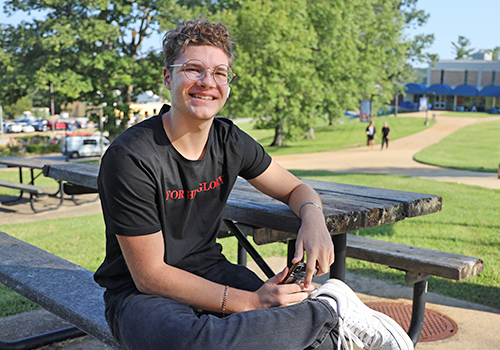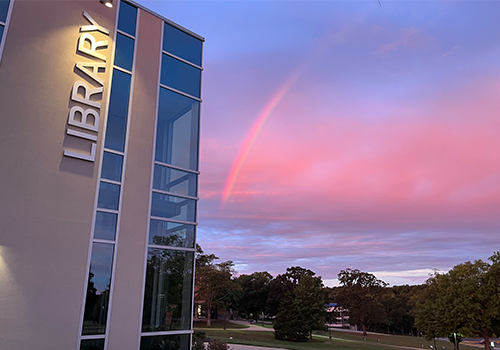Suicide Prevention
Jefferson College is committed to the success of all students, including those with depression or other mental health conditions. Jefferson College will:
- Acknowledge but not stigmatize mental health problems.
- Make suicide prevention a priority.
- Encourage students to seek help or treatment that they may need.
- Ensure that personal information is kept confidential.
- Allow students to continue their education normally as possible by making reasonable accommodations.
- Refrain from discrimination against students with mental illness, including punitive actions toward those in crisis.
Suicide Prevention Programs Available On and Off Campus
Crisis Intervention Access and Suicide Prevention Hotlines
- National Suicide Prevention Hotlines
- National Suicide and Crisis Lifeline - The 988 Lifeline provides 24/7, free and confidential support for people in distress, prevention and crisis resources for you and your loved ones. Call or Text 988, 988lifeline.org
- National Suicide Prevention Crisis Textline - The Crisis Textline is a not-for-profit that provides free, 24/7 crisis support via SMS, just text “HOME” to 741741 to talk to a trained crisis counselor, http://www.crisistextline.org
- The Trevor Project - Crisis intervention and suicide prevention for LFBTQ Youth. Call 1-866-488-7386 or text 678-678; http://www.thetrevorproject.org
- Veterans Crisis Line - Call 988 then press 1; Text 838255; www.veteranscrisisline.net
- State Suicide Prevention Hotlines
- Missouri Crisis Services - Call, text, or chat 988 https://dmh.mo.gov/behavioral-health/treatment-services/specialized-programs/crisis-services
- DeafLine Missouri - A videophone crisis hotline for individuals who are deaf or hard of hearing. Call 321-800-DEAF (3323) (Voice/TTY). Text HAND to 839863, https://deaflead.org/services/crisis-intervention/missouri-crisis-line/
- Local Suicide Prevention Hotlines
- Compass Health Network-call or text 988*. (If you are calling from an area code outside of Missouri, please call 888-237-4567.), https://compasshealthnetwork.org/
- Mental Health America of Eastern Missouri (MHA) - 314-773-1399, https://mha-em.org/
- Kids Under Twenty One (KUTO) - 1-888-644-5886, http://www.kuto.org/
Mental Health Program Access
- On Campus
- Student Wellness and Counseling Services
- Free counseling services for currently enrolled students, call 636-481-3215, email at counseling@jeffco.edu, or click on https://calendly.com/gholstein-jeffco. Jefferson College Hillsboro, top floor of the Student Center. Jefferson College Arnold on Thursday afternoons in room 107.
- Student Health Services
- No health services are available on campus
- Student Wellness and Counseling Services
- Off Campus
- Local Mental Health Clinics
- To locate crisis services near you, visit: Missouri Behavioral Health Access Crisis Hotlines https://dmh.mo.gov/crisis-assistance
- Compass Health Network: multiple locations in Jefferson County including Arnold, Festus, High Ridge, Hillsboro, and House Springs 844-853-8937, https://compasshealthnetwork.org/locations
- Chestnut Health Systems: 102 4th Street, Hillsboro, MO 63050, 636-638-2617, https://www.chestnut.org/
- Local Health Services
- Mercy Hospital Jefferson, 1400 US-61, Festus, MO 63028, 636-933-1000, https://www.mercy.net/practice/mercy-hospital-jefferson/
- Mercy Hospital South, 10010 Kennerly Rd, St. Louis, MO 63128, 314-525-1000, https://www.mercy.net/practice/mercy-hospital-south/
- Counseling Services
- Students Central Methodist University (virtual appointments), cccjeffco@centralmethodist.edu
- Compass Health Network: multiple locations in Jefferson County including Arnold, Festus, High Ridge, Hillsboro, and House Springs 844-853-8937, https://compasshealthnetwork.org/locations
- Chestnut Health Systems: 102 4th Street, Hillsboro, MO 63050, 636-638-2617, https://www.chestnut.org/
- Provident Behavioral Health, 1818 Lonedell Rd, Arnold, MO 63050, 314-533-8200 https://www.providentstl.org/
- Local Mental Health Clinics
Multimedia Application Access
- Jefferson College’s Suicide Prevention website: https://www.jeffco.edu/suicide-prevention maintains links to Jefferson College’s Suicide Prevention Programs; including but not limited to Crisis Hotline Contact Information, Suicide Warning Signs, Resources Offered, and Free-of-Cost Applications as well as online training platforms.
- Jefferson College’s Access to Services Providing Essential Needs (ASPEN) website: https://www.jeffco.edu/care-team/ASPEN maintains a link to the ASPEN virtual platform where individuals can access resources and for users who register, set up a profile and utilize a self-screener tool. Users who submit a self-screener will receive personalized feedback and be connected to the Care Team to receive individualized support and resources.
Reporting Concerns
Jefferson College encourages a See Something, Say Something, Do Something approach to addressing student concerns in order to create a positive culture of reporting on campus. There are multiple options for reporting concerns of unsafe, potentially harmful, dangerous, violent, or criminal activities, or the threat of such activities.
- Reporting methods include:
- Maxient Report: Faculty, staff, and students can submit an online Maxient Incident Report Form: https://cm.maxient.com/reportingform.php?JeffersonCollege which allows the reporter to identify the person they are concerned about and describe the concern. Reports are then routed to the appropriate point of contact on campus, typically the Care Team Coordinator and then the Care Team.
- Anonymous Reporting- Maxient allows for submission of reports without providing the reporter’s personally identifying information.
- Care Team: The Care Team assists in identifying, assessing, and evaluating student well-being and concerning student behaviors in a trauma-informed way. The Care Team designs intervention and outreach to promote individual safety, community safety, and student success to support an inclusive environment. The Care Team may also identify patterns of behavior that might suggest the need for ongoing or additional intervention. Connecting students with individualized resources, support, and accountability is at the core of Care Team interventions.
- To contact an available Care Team member, please call 636-481-3215.
- For more information on the Care Team, contact the Care Team Coordinator at hgillam1@jeffco.edu, 636-481-3262, or Student Center Room 211.
- Student Wellness and Counseling Services: For more information contact:
- By Phone 636-481-3215
- Email counseling@jeffco.edu.
- Jefferson College Police Department (JCPD). All officers are Crisis Intervention Trained (CIT) and are able to provide supportive responses during a crisis situation on campus. JCPD will work with Counseling Services, the Care Team, and the Incident Management Team (IMT) during crisis situations to ensure safety for all involved as well as coordinate EMS when appropriate.
- To contact the Jefferson College Police Department, please call 9-1-1 for emergencies or 636-481-3500.
- JCH-802 Mel Carnahan Drive, Apartment 214, Hillsboro, MO.
- JCA-1687 Missouri State Road, Arnold, MO.
- JCI- 4400 Jeffco Boulevard, Arnold, MO.
- Maxient Report: Faculty, staff, and students can submit an online Maxient Incident Report Form: https://cm.maxient.com/reportingform.php?JeffersonCollege which allows the reporter to identify the person they are concerned about and describe the concern. Reports are then routed to the appropriate point of contact on campus, typically the Care Team Coordinator and then the Care Team.
- Jefferson College seeks to remove barriers to individuals reporting concerns. Disciplinary action will not be used as a pretext for disciplinary action nor will Jefferson College bring disciplinary action against a student for suicide attempts, suicidal thought, or self-injury, including self-cutting. Any individual who reports or who is involved in a report will not be subject to disciplinary action for their own personal conduct violation(s) at or near the time of the incident, provided that such violation(s) did not and do not place the physical health or safety of another person at risk. Jefferson College may initiate an educational discussion or pursue other educational or therapeutic methods for those individuals.
Student Communication Plans
Jefferson College shall provide all incoming students with information about depression and suicide prevention resources available to students, including available mental health services, other support services, and student-run organizations, when available, for individuals at risk of or affected by suicide. Jefferson College shall also provide ongoing prevention and awareness campaigns. Jefferson College shall utilize multiple methods of communication, including website information, live presentations, email/letters, and participation in outreach events and campaigns, with students to advise them of available suicide prevention programs, crisis hotline contact information, suicide warning signs, resources offered, and free-of-cost applications, and outreach activities for suicide prevention. Examples include, but are not limited to;
- Campus wide emails promoting suicide prevention programs and resources.
- Ask, Listen, Refer Suicide Prevention Training Program incorporated in College 101 curriculum.
- Vikings Care Monthly Well-being Initiatives.
- Suicide Prevention Week, campus-wide events and activities.
- Ask, Listen, Refer, and other suicide prevention resources listed on website.
- Social media posts promoting suicide prevention resources.
- Suicide prevention and crisis hotline information posted in student housing and Viking Woods Club House.
- Suicide prevention and crisis hotline information is printed on the backside of all student identification cards.
Student communication efforts shall be ongoing, year round. Resources posted on the website will be updated as needed, and reviewed at minimum annually.
Ongoing Education and Training
- Ask, Listen, Refer: Jefferson College’s Suicide Prevention Training Program, Ask Listen Refer, is an online suicide prevention training with a goal to educate students, faculty, and staff with identify people at risk for suicide; recognizing the risk factors, protective factors, and waring signs of suicide; and responding to and getting help for people at risk. Ask, Listen, Refer also teaches how to ASK if someone is thinking about suicide, LISTEN to their response and REFER them to a professional. All students, faculty, and staff may access Ask Listen Refer at https://www.asklistenrefer.org/jeffco
- All first year students take Ask, Listen, Refer in their Introduction to College course for a grade.
- CSSRS/Safety Planning: The CSSRS is an evidenced based tool used to assess risk of suicide in an individual, and determine level of support needed to reduce risk. Counseling Services and the Care Team will provide bi-annual CSSRS/Safety Planning training for faculty and staff.
- RESPOND: RESPOND is designed to assist campus community members with recognizing individuals experiencing mental health concerns, providing support, and learning how to make the appropriate referrals to professionals who can assist further.
- Counseling Services, in partnership with the Vikings Care Student Wellbeing Subcommittee, provides bi-annual RESPOND training for faculty, staff, and students.









